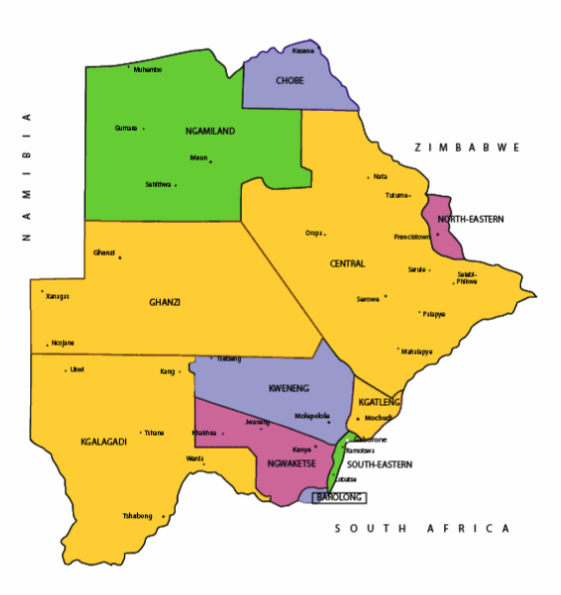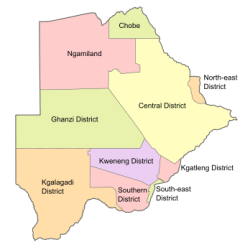Places and their polling stations in Takatokwane, Botswana
372 Motokwe
1725 Motokwe Primary School
1726 Motokwe Community Hall
1727 Khekhenye Primary School
1728 Tsetseng Primary School
1729 Tshwaane Primary School
373 Takatokwane-Dutlwe
1730 Takatokwane Primary School
1731 Takatokwane Kgotla
1732 Takatokwane Brigade
1733 Maseru Mobile Stop
1734 Magakabe Mobile Stop
1735 Dutlwe Primary School
1736 Dutlwe Community Hall
1737 Tent at Nhwi
374 Maboane-Ditshegwane
1738 Ditshegwane Community Hall
1739 Ditshegwane Kgotla
1740 Ditshegwane Primary School
1741 Sebotswane Mobile Stop
1742 Kgare Mobile Stop
1743 Masope VDC Huts
1744 Magagarape Debeers Camp
1745 Kosuwe VDC Huts
1746 Maboane Primary School
1747 Tent at Phuduhudu
1748 Tent at Seletse
375 Khudumelapye-Sesung
1749 Sesung Primary School
1750 Sesung Community Hall
1751 Sesung Kgotla
1752 Senogi VDC Huts
1753 Metsibotlhoko Primary School
1754 Khudumelapye Community Hall
1755 Khudumelapye Primary School
1756 Khudumelapye Kgotla
376 Salajwe
1757 Salajwe Primary School
1758 Salajwe Kgotla
1759 Tent at Mothate
1760 Kolojane Mobile Health Stop
1761 Lempu JSS
377 Kaudwane-Sorilatholo
1762 Kaudwane Rac
1763 Kaudwane Primary School
1764 Sorilatholo Primary School
1765 Molengwane VDC Huts
1766 Tent at Mereache
1767 Tent at Mosime
Reference: iec.gov.bw/index.php/electoral-districts/polling-stations.html
Botswana
Botswana is a country in Africa. It is topographically flat, with approximately 70 percent of its territory being the Kalahari Desert.
It is bordered by South Africa to the south and southeast, Namibia to the west and north, and Zimbabwe to the northeast.
Capital: Gaborone
Currency: Botswanan Pula
Official language: English
Population: 2.588 million (2021) World Bank
Dialing code: +267
Gross Domestic Product: 17.61 billion USD (2021) World Bank
Botswana’s ten districts are:
- Southern District
- South-East District
- Kweneng District
- Kgatleng District
- Central District
- North-East District
- Ngamiland District
- Kgalagadi District
- Chobe District
- Ghanzi District
Botswana’s councils created from urban or town councils are: Gaborone City, Francistown, Lobatse Town, Selebi-Phikwe Town, Jwaneng Town, Orapa Town and Sowa Township.






The name Botswana refers to ‘Land of the Tswana’. The landlocked, Southern Africa country is officially known as the Republic of Botswana.














Botswana is connected to Zambia through the Kazungula Bridge making it the world’s shortest border between two countries.
A country of slightly over 2 million people (2021), Botswana is one of the most sparsely populated countries in the world. It is essentially the nation state of the Tswana ethnic group, who make up 79% of the population.

About 11.6 per cent of the population lives in the capital and largest city, Gaborone.
Formerly one of the world’s poorest countries—with a GDP per capita of about US$70 per year in the late 1960s—it has since transformed itself into an upper-middle-income country, with one of the world’s fastest-growing economies.


The Tswana ethnic group were descended mainly from Bantu-speaking tribes who migrated southward of Africa to modern Botswana, living in tribal enclaves as farmers and herders.




In 1885, the British colonised the area and declared a protectorate under the name of Bechuanaland.
As colonisation stopped, Bechuanaland became an independent republic under its current name on 30 September 1966.


Since then, it has been a representative republic, with a consistent record of uninterrupted democratic elections and the lowest perceived corruption ranking in Africa since at least 1998.

The economy is dominated by mining and tourism. Botswana has a GDP (purchasing power parity) per capita of about $18,113 as of 2021, one of the highest in subsaharan Africa.


Botswana is the world’s biggest diamond producing country.
Its relatively high gross national income per capita gives the country a high standard of living and the third-highest Human Development Index of continental Sub-Saharan Africa (after Gabon and South Africa).
The country has been adversely affected by the HIV/AIDS epidemic. In 2002, Botswana began offering anti-retroviral drugs (ARVs) to help combat the epidemic.
Botswana is a member of the Southern African Customs Union, the Southern African Development Community, the Commonwealth of Nations, and the United Nations.

